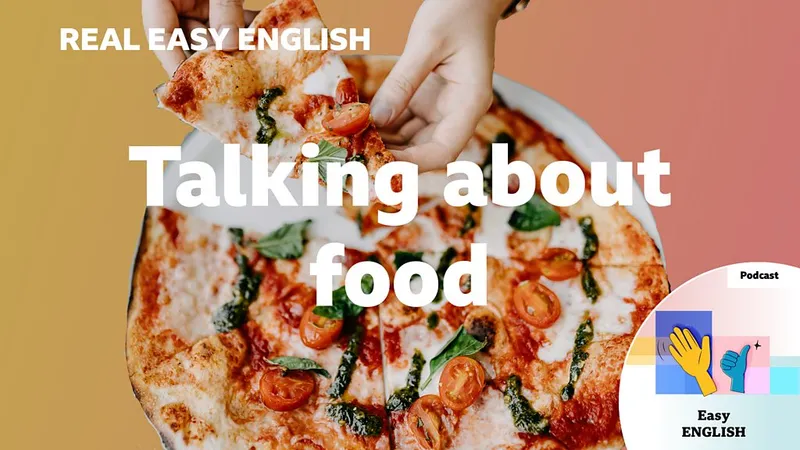Beth Welcome to Real Easy English from BBC Learning English. I’m Beth.
Neil And I’m Neil. In this podcast, we have a real conversation in easy English.
Beth If you want to read along, you can visit our website: bbclearningenglish.com.
Hi, Neil.
Neil Hi Beth. How are you?
Beth I’m very good, thank you. How are you?
Neil I’m pretty good, yes.
Beth Good, good. What are we talking about today?
Neil Well, today we are talking about food. In particular, we’ll talk about our favourite foods and how often we eat them.
Beth What an amazing topic. I have so much to say about food. But you said how often. What do we mean by how often we eat something?
Neil Good question! How often means how many times we eat our favourite food. So we might eat them every week, every day, or if we really like a food, we might eat it for breakfast, lunch and dinner - every meal!
Beth So, Neil, what is your favourite food?
Neil Well, that’s a really difficult question. But I really like fish.
Beth Ah, me too! I was going to say that! But actually, I really love seafood. So, I think I’d say any kind of dish with seafood in it I absolutely love.
Neil So, how often do you eat seafood, Beth?
Beth Well, not very often, actually. I have it when I go on holiday and I have it in restaurants sometimes, but I don’t really cook seafood at home. What about you? How often do you have fish?
Neil Oh, probably a few times a week.
Beth Really!?
Neil Maybe, yeah. Yeah. We eat a lot of fish.
Beth We sometimes have fish at home. I normally have it once or twice a week.
Neil Right.
Beth But I never have seafood at home, actually.
Neil Yeah, OK. So what is your least favourite food?
Beth Ooh… I absolutely hate baked beans!
Neil You hate baked beans!?
Beth I think they’re disgusting! I can’t even… the smell of them even makes me feel a bit sick.
Neil Oh, OK.
Beth So we’ve talked about the foods that we really like and the foods we don’t like. But in a general week, what do you normally cook?
Neil** Often** we’ll eat Indian curries, but also Italian pasta dishes or Spanish dishes and then sometimes more traditional British roast dinner kind of thing.
Beth Yeah. I think, generally, we have the same at home. Like, we eat a lot of food from different countries. But I have to say I usually cook quite a lot of pasta and quite a lot of rice at home in general. Just because they cook really quickly.
Neil So, Beth. You generally eat rice and pasta dishes. What does that mean? Generally?
Beth Well, we use generally and usually and normally for habits or things that we do a lot. So, for example, if I generally cook pasta or rice, that means maybe five times out of the seven in a week, I would say.
Neil OK, so that’s most of the time. If we use sometimes we mean that we’d do it less than generally.
Beth Yeah, sometimes might be two or three times a week. I guess it depends on what you’re talking about. But for example, with me I sometimes cook fish. Like I said I have it maybe twice a week. So I would say that’s sometimes.
Neil Beth, you said you hate baked beans. So do you ever eat baked beans?
Beth** Never**. No, I can’t stand them. So I never, ever have baked beans.
Neil Well, never is something that we don’t do. We just don’t ever do it.
I can’t believe you don’t like baked beans. Beans on toast is a classic!
Beth It is. But, no. Not for me. Let’s quickly recap the vocabulary we learnt during the conversation.
We learnt often which means we do something a lot. And we learnt how often, which we use to ask someone how many times they do something.
Neil** Usually**, normally, and generally, which are all ways to talk about things we do a lot.
Beth** Sometimes**, which we can use to talk about things we do, but not always or often.
Neil And never to talk about things we don’t do like eat beans, Beth.
Beth Yes, just like I never eat baked beans. Ugh, horrible!
Neil Thanks for listening to Real Easy English. Visit our website for more activities and courses to help you with your English: bbclearningenglish.com.
Beth Next week, we’ll talk about our friends.
Neil See you then, goodbye.
Beth Bye.
